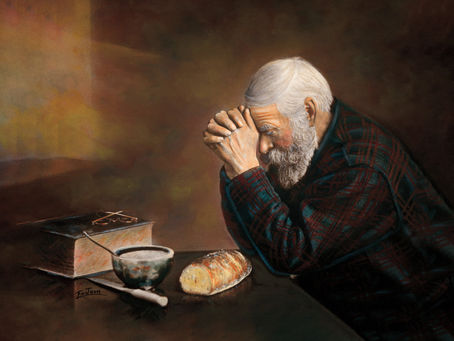top of page
From Reformation to Reformation
Ministries
Search


Hebrew: De Moor on the Authenticity of the Hebrew Text
I. Reading and Discussion: " The Authenticity of the Hebrew and Greek Originals, Part 1 " II. Reading and Discussion: " The Authenticity of the Hebrew and Greek Originals, Part 2 " III. Reading and Discussion: " The Authenticity of the Hebrew and Greek Originals, Part 3 " IV. Reading and Discussion: " The Authenticity of the Hebrew and Greek Originals Defended, Part 1 " V. Reading and Discussion: " The Authenticity of the Hebrew and Greek Originals Defended, Part 2
Dr. Dilday
1 day ago1 min read


De Moor IX:18: The Veneration of Angels, Part 2
[A fundraising update: We are 25% of the way to our fundraising goal 25 new $100/month subscribers! Thanks be to God. If you are being blessed by the translation work, please consider supporting the work and speeding it on its way. Click here to watch a brief video on the project.] β. To present to them the Religious Honor of Invocation, etc . That this sort of Worship of Angels everywhere obtained among the Gentiles from the most ancient times, the Most Illustrious ODÉ
Dr. Dilday
2 days ago19 min read


J.H. Heidegger's Corpus of Christian Theology: Theology in General: Natural Theology
[A fundraising update: We are 25% of the way to our fundraising goal 25 new $100/month subscribers! Thanks be to God. If you are being blessed by the translation work, please consider supporting the work and speeding it on its way. Click here to watch a brief video on the project.] 7. Natural Theology after the fall is asserted . But, after sin entered into the world, the sinner did not immediately and completely unlearn God. For even corrupted nature preserved for him a
Dr. Dilday
7 days ago12 min read


De Moor's Doctrine of Religion
We hear much about the Fundamentals of the Christian Faith. But what makes a particular doctrine "Fundamental"? Is it possible to make a list of "Fundamental Doctrines"? And what are the implications of this categorization? De Moor's treatment of this important topic is golden... Get it here: https://www.lulu.com/shop/steven-dilday/de-moors-didactico-elenctic-theology-chapter-iii-concerning-religion/hardcover/product-1p7qek9g.html?q=bernardinus+de+moor&page=1&pageSize=4 [
Dr. Dilday
Jan 311 min read


J.H. Heidegger's Corpus of Christian Theology: Theology in General: The Terms and Nature of Theology
[A fundraising update: We are 25% of the way to our fundraising goal 25 new $100/month subscribers! Thanks be to God. If you are being blessed by the translation work, please consider supporting the work and speeding it on its way. Click here to watch a brief video on the project.] 1. Solemn pronouncement of prayer . Following many other Men, eminent for piety and learning, and investing industry in like measure, in consigning the System of Orthodox Theology to writing, I
Dr. Dilday
Jan 297 min read


Wendelin's "Christian Theology": Doctrine of the Lord's Supper, Part 3
[A fundraising update: We are 25% of the way to our fundraising goal 25 new $100/month subscribers! Thanks be to God. If you are being blessed by the translation work, please consider supporting the work and speeding it on its way. Click here to watch a brief video on the project.] THESIS X: Hitherto the efficient . The Matter of the Lord’s Supper is either of which or concerning which . THESIS XI: The Matter of which is the sign or the thing signified. THESIS XII
Dr. Dilday
Jan 2712 min read


De Moor IX:18: The Veneration of Angels, Part 1
[A fundraising update: We are 25% of the way to our fundraising goal 25 new $100/month subscribers! Thanks be to God. If you are being blessed by the translation work, please consider supporting the work and speeding it on its way. Click here to watch a brief video on the project.] It is also fitting to venerate Angels. Concerning the Veneration due to Angels, a judgment is able to be made from those things that are said positively and negatively concerning the State of
Dr. Dilday
Jan 2414 min read


De Moor's Doctrine of Creation
For the first time in English... De Moor's treatment of the Doctrine of Creation is available in its entirety! If it contained nothing other than his exposition of the Six Days of Creation, it would be worth its weight in gold!
Dr. Dilday
Jan 231 min read


J.H. Heidegger's Corpus of Christian Theology: Theology in General: Summary
[A fundraising update: We are 25% of the way to our fundraising goal 25 new $100/month subscribers! Thanks be to God. If you are being blessed by the translation work, please consider supporting the work and speeding it on its way. Click here to watch a brief video on the project.] 1. Solemn pronouncement of prayer . 2. The origin of the word Theology. 3. The use of the same brought into the Church . 4. Synonyms ἔγγραφα, found in writing. 5. The definition of th
Dr. Dilday
Jan 224 min read


J.H. Heidegger's Corpus of Christian Theology: Preface to the Reader
To the pious, learned, and benevolent Reader, Greetings from Johann Heinrich Schweizer, Professor at the School in Zurich. [1] What is found in the frontispiece of the Hymns of DAVID , Psalm 1:2, 3, That Man is blessed, whose delight is in the law of Jehovah, with the result that he doth meditate in that Law day and night. He is like a Tree planted by the rivers of water, that bringeth forth its fruit in its season, the leaves of which fade not ; that is certainly worthy al
Dr. Dilday
Jan 177 min read


J.H. Heidegger's Corpus of Christian Theology: Title Page
Johann Heinrich Heidegger’s Corpus of Christian Theology Exhibiting The Doctrine of the Truth, which is according to godliness, and that against all Adversaries , Ancient and Modern, erring either in the Foundation of the faith, or around it, in such a way that the same time it contains a διατύπωσιν/ system of Old and New Testament Church History . And so it is an altogether Full System of Theology, Didactic, Elenctic, Moral, and Historical. Volume 1 Transl
Dr. Dilday
Jan 111 min read


J.H. Heidegger's Corpus of Christian Theology: Who Is Johann Heinrich Heidegger?
Johann Heinrich Heidegger was born to Johann Hartmann, dean of the chapter, and Magdalena Wagner, a pastor’s daughter, on July 1, 1633, at Bäretswil in the Canton of Zürich. Johann Heinrich began his theological studies at the Collegium Carolinum in Zürich, and proceeded to Marburg, where he lived with, and studied under, the celebrated Ludwig Crocius, one of the most prominent theologians of the German Reformed Church. [1] He finished his studies at the Heidelberg Univers
Dr. Dilday
Jan 105 min read


De Moor IX:17: The Office of Angels, Part 2
[We could use your help: If you are being blessed by the translation work, please consider supporting the work and speeding it on its way. Click here to watch a brief video on the project. ] On this controversy consult CALVIN’S Institutes of the Christian Religion , book I, chapter XIV, § 7; SPANHEIM’S Dubia Euangelica , part III, Doubts LXI, LXII, pages 273-279; VOETIUS’ de Angelis Tutelaribus , Disputationum theologicarum , part I, pages 897-905; and ODÉ, who most
Dr. Dilday
Jan 816 min read


Lampe on Church History: The Apostolic Church, Part 4
[We could use your help: If you are being blessed by the translation work, please consider supporting the work and speeding it on its way. Click here to watch a brief video on the project. ] Enemies and Persecutions XXXVI. The first enemies of nascent Christianity were the Jews ; their twofold persecution is narrated in Acts. The first, excited by the Sanhedrin, devoured Stephen . [1] The second, a few years later, had Herod Agrippa as its author, in 44 AD, the fourt
Dr. Dilday
Dec 27, 20257 min read


De Moor IX:15: The Office of Angels, Part 1
[We could use your help: If you are being blessed by the translation work, please consider supporting the work and speeding it on its way. Click here to watch a brief video on the project. ] The Office of the Good Angels is the Ministry of God , the same that belonged of old to all Angels, concerning which above in § 12; but which the Good Angels alone willingly furnish. However, to this is incorrectly referred , 1. The perpetual Prefecture of certain Regions or Men, to ea
Dr. Dilday
Dec 26, 202517 min read


Lampe on Church History: The Apostolic Church, Part 3
Heresies XXIX. In those first beginnings of the Christian Church, that various seeds of heresies had already sprung up, is evident even from the Apostolic writings, in which are found diverse names of those that had fallen from the truth and faith. To Hymenæus and Philetus , with whom is also joined Alexander , is imputed the denial of the resurrection of the dead . [1] But, whether by this dogma they were following in the steps of the Sadducees (for we readily admit t
Dr. Dilday
Dec 20, 20254 min read


De Moor IX:15: The Cause of the Goodness of the Good Angels, Part 3
[We could use your help: If you are being blessed by the translation work, please consider supporting the work and speeding it on its way. Click here to watch a brief video on the project. ] They were not confirmed through the Grace of the Mediator : α. Because Scripture never speaks in this fashion, which assigns Christ as Mediator to Men alone, and never says that He was constituted as Mediator between God and the Angels, 1 Timothy 2:5; Luke 2:10, 11. β. Indeed, Scr
Dr. Dilday
Dec 19, 20257 min read


Wendelin's "Christian Theology": Doctrine of the Lord's Supper, Part 2
[ If you are being blessed by the translation work, please consider supporting the work and speeding it on its way. Click here to watch a brief video on the project. ] THESIS VIII: Hitherto the words of the commandment . They are the words of promise, which make known and disclose the thing signified in sacramental expression, even concerning the external symbols: as concerning the bread, this is my body ; concerning the cup, or [the wine] in the cup, this is my blood of
Dr. Dilday
Dec 13, 202537 min read


De Moor's Theological Disputation on Ephesians 5:14: How Does the Prophecy Serve the Apostle's End?
Finally, it remains to respond in a few words to the seventh Question mentioned in § 1, How does the Apostle, in citing this prophecy, reach the goal that he intends? tying verse 14 with what precedes by the logical conjunction διό/ wherefore . In context, Paul addresses believing Ephesians, who were sometimes darkness, but now were made Light in the Lord , verse 8. He had instruct these, in verse 11, καὶ μὴ συγκοινωνεῖτε τοῖς ἔργοις τοῖς ἀκάρποις τοῦ σκότους, μᾶλλον δ
Dr. Dilday
Dec 9, 20252 min read


De Moor's Theological Disputation on Ephesians 5:14: What Is the Meaning of the Promise? (Part 2)
But now, when the text applies this promise to those awaking from sleep and rising from the dead , from this it is not gathered that supernatural Grace is only going to follow upon the right use of natural gifts and strength; as if by virtue of these the natural man could be awakened from spiritual torpor and arise from the death of sin. The contrary is taught by the whole Scripture; our National Synod of Dort, closely following the Scripture in this matter, is to be revered
Dr. Dilday
Dec 9, 20254 min read
bottom of page